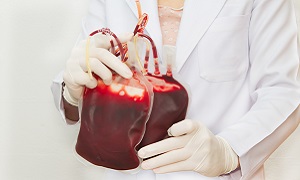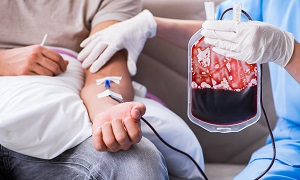Best Doctors in India for Sickle Cell Anemia treatment
Best Hospitals in India for Sickle Cell Anemia treatment
KIMS Hospital, Hyderabad
- City: Hyderabad, India
Hospital Highlights:
- KIMS Hospital (a brand name of Krishna Institute of Medical Sciences) is one of the largest and best multi-speciality hospitals in Hyderabad. The hospital provides various treatments to an enormous number of patients.
- The hospital has a capacity of more than 3000 beds. KIMS Hospitals offers different healthcare services in more than 25 specialities and super specialities.
- The hospital is equipped with modern medical equipment and technology. It has robotic equipment to provide minimal invasive techniques for patients.
- The hospital is aimed at providing world-class healthcare facilities and services at an affordable cost for patients.
- The various specialities and departments of the hospital include neurosciences, gastroenterology & hepatology, robotic science, reproductive sciences, dental science, oncological sciences, organ transplantation, heart and lung transplantation and mother and child care.
Fortis Hospital, Shalimar Bagh
- City: New Delhi, India
Hospital Highlights:
- Fortis Hospital in Shalimar Bagh is a multi-super specialty hospital that strives to provide world-class patient care by leaving no stone unturned.
- Fortis, Shalimar Bagh, with 262 beds and a 7.34-acre footprint, provides the best level of medical care through its team of doctors, nurses, technicians, and management professionals.
Reliance Hospital, Mumbai
- City: Mumbai, India
Hospital Highlights:
- Reliance Hospital is one of the best super-specialty care hospitals in Navi Mumbai.
- The main purpose of this hospital is to become a trustworthy place for the best health and hope for society. The hospital is well connected to the suburbs of Mumbai and Navi Mumbai.
- The hospital has various specialty departments, viz., Accident & Emergency, Anesthesiology, Dental Services, Dermatology, Diabetology, Dietetics Nutrition, Endocrinology, ENT, Gastroenterology, General Surgery, Gynaecology And Obstetrics, Hepato Pancreato Biliary Surgery, Infectious Disease, Internal Medicine, Interventional Radiology, Laboratory Medicine, Minimal Access Laparoscopic Surgery, Nephrology, Neurosciences, Opthalmology, Orthopaedics, Paediatrics, Pain Management Palliative Care, Physical Medicine Rehabilitation, Plastic And Reconstructive Surgery, Psychiatry, Pulmonary Medicine, Radiology, Rheumatology, Transplant, Urology Andrology, Vascular Surgery
Lilavati Hospital & Research Centre, Mumbai
- City: Mumbai, India
Hospital Highlights:
- Lilavati Hospital & Research Centre is India’s premier multi-speciality tertiary care hospital and has been recognised as a global medical excellence centre.
- Lilavati Hospital & Research Centre has built an unrivalled level of trust with its patients over the years, thanks to a solid foundation that comprises cutting-edge facilities, the best medical competence, research, education, and charity endeavours.
- The hospital is quite proud of the fact that it now serves patients from all kinds of backgrounds, not just from the United States but from all around the world.
- The hospital has a total of 323 beds, one of the largest Intensive Care Units (ICUs), 12 Operation Theatres with modern amenities, over 300 consultants, and almost 1,800 personnel.
Venkateshwar Hospital, Dwarka, New Delhi
- City: New Delhi, India
Hospital Highlights:
- State-of-the-art technology and devoted healthcare professionals have been brought together under one roof at Venkateshwar Hospital to provide genuine medical care. The hospital’s professionals work together as a team to deliver the best possible treatment to their patients, using the most sophisticated equipment and information technology.
- Venkateshwar Hospital’s mission is to attain global excellence in healthcare by employing evidence-based, ethical clinical practices and cutting-edge technology by a team of highly skilled experts.
MGM Healthcare, Chennai
- City: Chennai, India
Hospital Highlights:
- Located in Chennai, India, MGM Healthcare is a top multispecialty hospital that provides all medical services under one roof.
- Since its founding in 2019, MGM Healthcare has quickly become a leading national referral centre, creating several innovative flagship initiatives.
- MGM Healthcare combines next-generation medical and digital technologies to provide better patient results.
- With 12 centres of excellence, more than 400 inpatient beds, 100 intensive care unit beds, and 24/7 emergency care, MGM Healthcare leaves no chance in redefining the patient experience in Chennai.
- MGM Healthcare boasts 250+ expert doctors across 30+ departments, including Cardiology, Pulmonology, Neurology, Obstetrics & Gynaecology, and more.
- They house 12 specialized Centres of Excellence, including Neurosciences, Orthopaedics, and Multi-Organ Transplantation.
- Their team of doctors, nurses, and paramedics works together to give every patient individualized treatment.
Sickle Cell Anemia
Sickle cell anemia is an inherited blood disorder. People suffering from this disease don’t have adequate healthy red blood cells that can carry oxygen throughout their bodies. The red blood cells are flexible and disc-shaped. Normally, they can easily move through the blood vessels. However, in Sickle Cell Anemia, the red blood cells acquire the shape of a sickle or a crescent moon. The cells become sticky and rigid. Ultimately, they are not able to pass through the small blood vessels. This blocks or slows down oxygen and blood flow to various parts of your body.
Sickle cell anemia is an autosomal recessive disease and you will have two copies of the genes if you are suffering from this disease. The cells trapped in the blood vessels can cause tissue damage and pain. You can only inherit the disease from your family and you will have the disease by birth. You cannot acquire the disease later in life due to external factors. The other names for the disease are Hemoglobin S disease, sickle cell disorders, HbS disease and sickle cell disease.
Types of Sickle Cell Anemia
Hemoglobin carries oxygen in the red blood cells. Different mutations in the genes cause four different types of Sickle Cell Anemia.
Hemoglobin SS disease: Considered the most common type of Sickle Cell Anemia, it occurs if you inherit copies of the hemoglobin S gene from your mother as well as father. This leads to the formation of the Hb SS. It is the most severe type of SCD and you may experience symptoms at a high rate.
Hemoglobin SC disease: As a less severe type of anemia, it is the second most common form of SCD. When you inherit the Hb C gene from one of your parents & the HbS gene from the other parent, you will suffer from this type.
Hemoglobin SB+ (Beta) Thalassemia: It affects the production of the beta-globin gene. With less production of beta protein, the size of the red blood cells reduces. You will suffer from hemoglobin S beta thalassemia if you inherit the Hb S gene.
Hemoglobin SB 0 (Beta-zero) Thalassemia: It is another type of Sickle Cell Anemia that involves the beta-globin gene. You may experience some severe symptoms if you are suffering from this disease.
Causes of Sickle Cell Anemia
A defect in the hemoglobin-beta gene present on chromosome 11 causes sickle cell disease. Due to the defect, abnormal hemoglobin is formed. You will have the disease if both your parents pass on the abnormal hemoglobin gene to you. If you have only one defective hemoglobin-beta gene, you are a carrier of the disorder. You won’t experience the symptoms of Sickle Cell Anemia but you can pass the disease to your children if your husband or wife is also a carrier of the trait.
Symptoms of Sickle Cell Anemia
The first signs of Sickle Cell Anemia appear when the child is 5 months old. The symptoms of SCD include:
- Anemia- You will have very few red blood cells when the sickle cells break easily and die. While the red blood cells normally live for 120 days before their death, the sickle cells hardly live for 20 days. This causes anemia or a shortage of red blood cells. Because of this, your body won’t get adequate oxygen and cause fatigue.
- Pain- You will also experience episodic pain when the sickle-shaped cells obstruct the blood flow through the blood vessels. The intensity of the pain will vary and it may sometimes last for a few weeks.
- Swelling- The sickle-shaped cells block blood flow to the various parts of your body and cause swelling.
- Infections- You may be at a higher risk of infections when sickle cells cause damage to your so spleen.
- Delayed growth- Your body gets the required nutrients and oxygen for the growth from the red blood cells. Sickle-shaped cells slow down the growth of your body.
- Vision problems- The sickle cells may get stuck into the blood vessels that supply your eyes. This can cause damage to the portion of your eyes that produces visual images- the retina. Ultimately, you will suffer from vision problems.
Diagnosis of Sickle Cell Anemia
Treatment Options for Sickle Cell Anemia
Medications
Preventing infections
Blood transfusions
Stem cell transplant

Healthy diet
Avoiding extreme temperatures
Talking














